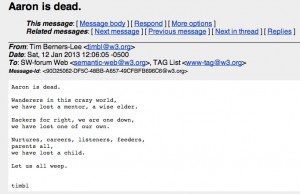Wonderful reflective post by Dave Winer. Sample:
Computers are amazing things, they really are, in ways most non-technical people aren’t even aware of. For example, when I learned about the process of bootstrapping compilers I was blown away. Still am actually. I tried explaining it to everyone I knew who wasn’t a programmer. The only person who got it, sort of, was my uncle, a mechanical engineer. He could see using a hammer to make a hammer, so what’s the big deal. How about using a specific hammer to make itself? How about that! His eyes glazed over. Yours probably are too. But ask someone who has made a real life compiler and see how mystical they get.
So we programmers in a sense are a secret society. Until you learn the handshake you aren’t one of us. And we can be pretty arrogant about it. Until the computer kicks our ass. Or the market. Or users. Then we learn really quickly that what we learned in school was just the beginning. That when we thought we understood everything that was just the arrogance of youth. It’s functional. Because how else could you take on the world if you understood how huge and complex and fucked up the world actually is! :-)
This is when depression sets in. All of a sudden you see that you are not all-powerful, you can’t handle everything the world throws at you. But then what do you do if you’ve told everyone you can deal with it, that you’ll come out on top? When I got to that point, which I remember very clearly, I felt I couldn’t possibly face failure. I was locking up the office of Living Videotext one night, knowing the next day I would be firing half the company, and having no idea how we were going to bail it out. Yes, you can get lower than that. But between the two paths, one up and the other down, there wasn’t much margin for error.
He’s such a wise old bird. Which of course is why I read him.




